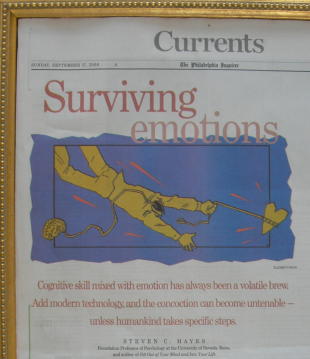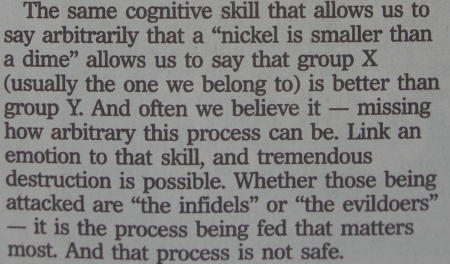





|
|
|
|
September 17, 2006
Feed me more pain now!
The "Currents" section of today's Philadelphia Inquirer has a huge piece by psychologist Steven C. Hayes titled "Surviving Emotions." Unfortunately, the piece itself survives nowhere except in the Inquirer's hard copy, which makes it rather hard to comment intelligently on it in a blog post. But there's such a pretty picture accompanying the piece that I couldn't resist framing it in a photograph (or would that be photographing it in a frame?):

As the sub-headline warns, humankind is at risk: Cognitive skill mixed with emotion has always been a volatile brew. Add modern technology, and the concoction can become untenable -- unless humankind takes specific steps.Now, that strikes me as important. Important enough, at least, that the idea ought to be linkable (at least findable) online somewhere. It's challenging to come up with the gist of Hayes' concerns, but I'll try to come up with a quote (what a royal pain in the ass it is to transcribe; I hope someone appreciates my pain!): The Internet, radio and TV pour out rhetoric that feeds fears and dehumanizes those with different religious or political views, providing endless reasons for our biases. Physical technology places every object of desire in front of us 24/7, from sugar-coated food to sex-charged images.Ye gods! I grew so tired of typing that I resorted to photography. Whether a photographic image of text alters the effect on the emotions, I do not know. I'd like to think accuracy is the important thing, but you never know. Anyway, I'm fed up with transcription, so I'm feeding up the image: 
In the Inquirer article, Dr. Hayes is mostly silent on the sources of food and the human volition involved. He focuses on dealing with the emotion that results, and he proposes a new kind of cognitive therapy which neither suppresses emotions, nor allows them to control (both of which lead to problems), by treating emotions not as emotions, but as thoughts about emotions. "Happiness Isn't Normal" is how Time Magazine characterized Dr. Hayes' central philosophy. Whether ACT is a cult or not, a recurrent theme in Hayes's work is that it can save the world: "We could get Muslims and Jews together in a workshop," Hayes said in Washington. "Our survival really is at stake."Sounds like pretty powerful stuff. My problem with the Inquirer version is that if this stuff can save the world, why not share it with the world, by putting it out there for the world to see? As to the substance, I'm a skeptic, as is my wont. While I completely agree with Hayes that emotions should not control us and that stifling or suppressing them is a bad idea, he doesn't seem to tackle the problem of what to do about dissembled emotional triggers from external sources (those who emotionally "feed") -- a problem I see constantly in the use of manipulative language, code language, hidden undisclosed meanings. I think it is only fair to identify (at least try to identify) attempts at emotional manipulation for what they are. (This, I think, is especially true when the intent is intimidation.) Whether one stifles the emotions thus provoked, lives with them, recognizes them as mere thoughts about emotions is another issue. As is happiness. I tend to be a Buddhist in that regard, as I think life is suffering. Death ends it. Whether that life suffering can or should be relieved is, I think, up to the individual. "Get rid of the emotion now" is certainly a poor approach to dealing with emotions. But what should be the approach when people insist on sharing their emotions, and even want them to be felt as they feel them? There's a bit too much of this going on as it is, but when it's concealed I call it emotional manipulation. Is it really fair to trick other people into feeling what you feel, but which they might not want to feel? I don't think it is, and I think it's at least as important as the question of how to deal with the resultant emotions. Relational Frame Therapy might be a very helpful thing if it helps people cope with their emotions. But is there anything wrong with avoiding emotional frameups? The list that follows is called a "Summary of the key features" of Relational Frame Therapy: The development of relational responding can be organized into a rough list that gradually becomes more and more complex. We are not presenting this list as a set of stages or steps, and we would expect them to be sequenced only in broad terms and even then only if the training history is typical. Nevertheless, this list gives a sense of the complexity that emerges from the small set of core concepts in Relational Frame Theory. posted by Eric on 09.17.06 at 10:57 AM
Comments
Alan thanks, but I have a scanner, and whether I scan or take a photo, it's really six of one, half dozen of the other. My camera obtains a better image than my scanner, and much more quickly. Plus when I scan the thing, and then run the OCR, I end up with garbled text that takes so long to edit that it's easier to transcribe the portion I want. I just scanned two long columns from that piece, and what I got follows. (I think you'll agree that it's extremely annoying to edit something like this.) **QUOTE** become extended because OUT cogmtne drugs desigOEd to reinove difficult thoughts I suppose there are newer scanners, with ever-newer software, requiring uninstalling of older scanners with older software. This raises the old "devil you know" issue.... Anyway, I do appreciate your advice. I might be better off with no scanner at all, as I'd be more motivated to go out and buy one. "Buy one" has a better (dare I say it?) emotional appeal than "buy another one." Eric Scheie · September 18, 2006 02:56 PM |
|
September 2007
WORLD-WIDE CALENDAR
Search the Site
E-mail
Classics To Go
Archives
September 2007
August 2007 July 2007 June 2007 May 2007 April 2007 March 2007 February 2007 January 2007 December 2006 November 2006 October 2006 September 2006 August 2006 July 2006 June 2006 May 2006 April 2006 March 2006 February 2006 January 2006 December 2005 November 2005 October 2005 September 2005 August 2005 July 2005 June 2005 May 2005 April 2005 March 2005 February 2005 January 2005 December 2004 November 2004 October 2004 September 2004 August 2004 July 2004 June 2004 May 2004 April 2004 March 2004 February 2004 January 2004 December 2003 November 2003 October 2003 September 2003 August 2003 July 2003 June 2003 May 2003 May 2002 AB 1634 See more archives here Old (Blogspot) archives
Recent Entries
• Hurtful for me, but not for thee?
• Bipolarizing the election? • "He just manages to find the buttons to push." • "collective slap in the face"? • Too Much Liberty • Language tools • The Elements • Bought And Paid For • Does it take a "real man" to change a tire? (Puh-leez!) • Don't be a wuss over Clinton's puss!
Links
Site Credits
|
|
Eric, the next time you have enough money for some coffee down at Starbucks, take it instead to your computer store and get a scanner. Hell, you can get a scanner-fax machine-copier-printer for dang cheap now-a-days down at Wal-Mart. It'll save your fingertips and flashcard memory.